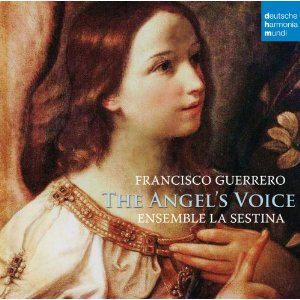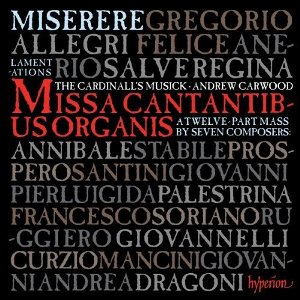Francisco Guerrero: The Angel's Voice
Originally written for musicalcriticism.com
07 May 2011
Far from being a just another cutesy title, The Angel's Voice explores a wealth of music written for upper voices by the Spanish composer Francisco Guerrero (1528-1599). These compositions depart from the traditional 4-voice cantus-altus-tenor-bassus texture and use modern SAT voices and even those scored ad aequales, for equal voices. Reasons for writing in upper registers (and indeed lower ones too) in the sixteenth century can vary from a pragmatic need to satisfy the vocal forces at a particular composer's disposal to the need to invoke deeper meaning by illustrating some symbolic or theological content.
Guerrero spent his entire working life in Spain with appointments as maestro de capilla of Jaén Cathedral (aged 17) and maestro de capilla of Seville Cathedral on 9 March 1574 (after some 23 years in the assistant's post). He did, however, live a rather adventurous life; he undertook some major travels and was apparently twice captured by pirates when he travelled by sea between Genoa and Marseilles. Despite being home-grown in an age when so many composers 'cut their teeth' in Italy, Guerrero is one of the greatest Spanish composers, alongside Victoria and possibly Morales, in the field of church music in the later 16th century. This is a position that only recordings such as this one can really help us understand. There has long been a paucity of sixteenth-century Iberian music on disc, and considering the sheer volume and quality of Guerrero's work it comes as a surprise that there are currently fewer than fifteen discs exclusively devoted to his music on Amazon. After all, Guerrero composed 18 mass settings, over 150 secular works in other genres, as well as a modest amount of secular works. This new Album by Ensemble La Sestina is therefore both a welcome addition and a necessary expansion of the current discography and in standard it sits happily alongside the work of polyphonic giants The Tallis Scholars, The Cardinall's Musick and Westminster Cathedral Choir, who are among the highest-profile contributors on disc.
The mass on this recording is one in a long tradition of works based on the L'homme armé song which has possible connections with Charles the Bold and the knightly retinue of his father (Duke Philip-the-Good of Burgundy) called 'The Order of the Golden Fleece'. Certainly Guerrero is honouring a rich tradition by incorporating this song into his mass, yet the results are startlingly short and plain despite being modelled on a mass of the same name by Morales. That may sound like a criticism, but despite what Adriano Giardina himself refers to as 'loose woven' polyphony Guerrero's mass is exceedingly beautiful both in musical content and as realised in this performance. Softer sounding than the often laser-like brilliance of British Ensembles, Giardina's singers on are clearly enjoying the imitative nature of the part writing and invite us into an intimate and closely recorded sound world. The balance of clarity and delicacy in the Benedictus is especially well judged and deserves repeated listening.
The opening four voice motet of this programme, Gabriel archangelus, is in a more dense and serious style invoking a grandeur that is not so immediately apparent in the mass with its many sections for just two or three voices. There is some particularly beautiful singing in this motet (as indeed there is throughout the disc) but the breathtaking architecture of Guerrero's rolling phrases can feel rather underplayed in such a gentle performance. Maybe I am simply used to hearing Guerrero sung more stridently but I would certainly welcome either some more emotional charge or some more volume to compliment the motet's style.
The central section of this programme is somehow the most intriguing. A selection of three and four part Canciones y villanescas espirituales from a 1589 publication provide a quite different musical landscape which belies their religious sentiments. Madrigalian traits abound in the canciones whilst Giardina draws attention to the 'folksy' character of the villanescas (triple time, more use of homophony). These Spanish language works are not always easy to sing, although Ensemble La Sestina tackles them with an enviable skill and panache, which often allows them to bring out the impromptu qualities of the piece. There is a rather obvious edit at about 2'30 in vana sperança, but the performance is, as a whole, so good that it's hard to be distracted by it.
By choosing such contrasting pieces, Giardina and his ensemble offer a fascinating glimpse into the works of this major sixteenth-century composer. There is, I am convinced, much more to discover about Guerrero, and this recording will be welcomed by all who enjoy Spanish polyphony as well as complementing the many discs now available as part of Victoria's anniversary year.
Ensemble La Sestina / Adriano Giardina (Deutsche Harmonia Mundi 88697824012)
07 May 2011
Far from being a just another cutesy title, The Angel's Voice explores a wealth of music written for upper voices by the Spanish composer Francisco Guerrero (1528-1599). These compositions depart from the traditional 4-voice cantus-altus-tenor-bassus texture and use modern SAT voices and even those scored ad aequales, for equal voices. Reasons for writing in upper registers (and indeed lower ones too) in the sixteenth century can vary from a pragmatic need to satisfy the vocal forces at a particular composer's disposal to the need to invoke deeper meaning by illustrating some symbolic or theological content.
Guerrero spent his entire working life in Spain with appointments as maestro de capilla of Jaén Cathedral (aged 17) and maestro de capilla of Seville Cathedral on 9 March 1574 (after some 23 years in the assistant's post). He did, however, live a rather adventurous life; he undertook some major travels and was apparently twice captured by pirates when he travelled by sea between Genoa and Marseilles. Despite being home-grown in an age when so many composers 'cut their teeth' in Italy, Guerrero is one of the greatest Spanish composers, alongside Victoria and possibly Morales, in the field of church music in the later 16th century. This is a position that only recordings such as this one can really help us understand. There has long been a paucity of sixteenth-century Iberian music on disc, and considering the sheer volume and quality of Guerrero's work it comes as a surprise that there are currently fewer than fifteen discs exclusively devoted to his music on Amazon. After all, Guerrero composed 18 mass settings, over 150 secular works in other genres, as well as a modest amount of secular works. This new Album by Ensemble La Sestina is therefore both a welcome addition and a necessary expansion of the current discography and in standard it sits happily alongside the work of polyphonic giants The Tallis Scholars, The Cardinall's Musick and Westminster Cathedral Choir, who are among the highest-profile contributors on disc.
The mass on this recording is one in a long tradition of works based on the L'homme armé song which has possible connections with Charles the Bold and the knightly retinue of his father (Duke Philip-the-Good of Burgundy) called 'The Order of the Golden Fleece'. Certainly Guerrero is honouring a rich tradition by incorporating this song into his mass, yet the results are startlingly short and plain despite being modelled on a mass of the same name by Morales. That may sound like a criticism, but despite what Adriano Giardina himself refers to as 'loose woven' polyphony Guerrero's mass is exceedingly beautiful both in musical content and as realised in this performance. Softer sounding than the often laser-like brilliance of British Ensembles, Giardina's singers on are clearly enjoying the imitative nature of the part writing and invite us into an intimate and closely recorded sound world. The balance of clarity and delicacy in the Benedictus is especially well judged and deserves repeated listening.
The opening four voice motet of this programme, Gabriel archangelus, is in a more dense and serious style invoking a grandeur that is not so immediately apparent in the mass with its many sections for just two or three voices. There is some particularly beautiful singing in this motet (as indeed there is throughout the disc) but the breathtaking architecture of Guerrero's rolling phrases can feel rather underplayed in such a gentle performance. Maybe I am simply used to hearing Guerrero sung more stridently but I would certainly welcome either some more emotional charge or some more volume to compliment the motet's style.
The central section of this programme is somehow the most intriguing. A selection of three and four part Canciones y villanescas espirituales from a 1589 publication provide a quite different musical landscape which belies their religious sentiments. Madrigalian traits abound in the canciones whilst Giardina draws attention to the 'folksy' character of the villanescas (triple time, more use of homophony). These Spanish language works are not always easy to sing, although Ensemble La Sestina tackles them with an enviable skill and panache, which often allows them to bring out the impromptu qualities of the piece. There is a rather obvious edit at about 2'30 in vana sperança, but the performance is, as a whole, so good that it's hard to be distracted by it.
By choosing such contrasting pieces, Giardina and his ensemble offer a fascinating glimpse into the works of this major sixteenth-century composer. There is, I am convinced, much more to discover about Guerrero, and this recording will be welcomed by all who enjoy Spanish polyphony as well as complementing the many discs now available as part of Victoria's anniversary year.
Ensemble La Sestina / Adriano Giardina (Deutsche Harmonia Mundi 88697824012)



Comments
Post a Comment